Solar Trikes for Africa: Sustainable Charity, or Virtue Signaling?
Over the years I've read about loads of charitable projects to supply Africa and other impoverished nations with what they need to industrialize and self-educate. One Laptop Per Child is a good example of a project with all the right intentions, which amounted to nothing in the end.
For that reason I view most of these projects with justifiable skepticism. Have they actually designed a product that third world customers need, will get a lot of use out of day to day and can afford? Or is it just meant to attract investment dollars, and to hell with the results?
This is what I was thinking when studying the Solar E Cycle, brainchild of Robert Christen from Quebec. Is this really something people in developing countries need? Yes, it solves the problem of the long journeys many currently make on foot just to buy water.
Is it something they're liable to use frequently? At the planned rental rate of 50 cents to $1 per day, probably it will see a lot of use. Renting them out also obivates the problem of the high cost if he meant to sell these outright. So what's the problem?
Those are lead acid batteries down there. The big black clunky block shaped things. Low upfront cost, but a cycle life of perhaps 300 charges, versus over 1,000 for newer lithium ebike batteries. The cost for an equivalent battery is perhaps twice as much for lithium versus lead acid but they last three times as long.
This means you'll need to replace the lead batteries three times before the lithium battery needs to be replaced once. It should be pretty clear that lithium is the more economical choice. Yet I keep seeing solar power projects intended for Africa which make use of lead batteries.
That's bad news for a product intended for a very harsh, challenging environment. It needs to "just work" without maintenance and for many years at a time. Even as a rental, the lead batteries will create a lot more waste over time than if lithium batteries were used.
Elon Musk knows this, and one of Tesla's latest acquisitions is MPower, a company that leases solar energy to Africans. It's basically a much cheaper, scaled down version of the Power Wall, with a 60 watt hour lithium battery and a pair of 25 watt panels (for a total of 50 watts).
This is hypothetically just enough to keep a laptop running, but in most cases will only be used to run LED lights and charge cell phones. For that purpose, it's ample. MPower does not sell the equipment but rather sells the power it generates, for $6 per month. Same business model as Tesla Energy (formerly Solar City).
The panels will easily last thirty years, and the lithium battery will last at least five, possibly as much as ten if LiFePO4 cells are used. That's the kind of longevity needed for such a challenging environment. They can't just toss out a gadget that doesn't live up to the promises and experimentally buy a different one, as they live on a precariously small income.
I've been guilty in the past of finding projects like this and, when they use lead batteries, bothering them to upgrade to lithium. I posted frequently on the Arcimoto facebook years ago that they shouldn't use lead batteries, and now they don't. Probably more attributable to the steep decline in lithium battery prices, but a win either way.
What I really like about the Solar E Cycle concept is that it's not just a vehicle. It does supply powered transportation, around 30 miles per charge at 30mph, but it can also be used as a stationary solar power generator. Equipment will be available for connecting it to homes, so that it can function very similarly to the MPower system.
Only, the panels are much larger. You can run a lot more off panels this size than just lights, a radio and a cell phone charger. You could run a cooler, a small electric oven, a computer, or any number of other higher draw devices. Not all at once mind you, but it's a huge step up.
It's also combined with powered transportation, solving many problems that citizens of developing countries have all at once, in the same machine. That's why I have such high hopes for this company, I just dread the possibility it will be a flop like OLPC because not enough thought was given to what the environment demands.
I'll be firing him an email about my concerns soon. Either way I hope it's a success, the concept is excellent. Just gotta switch over from lead to lithium and it'll be perfect.
Stay Cozy!
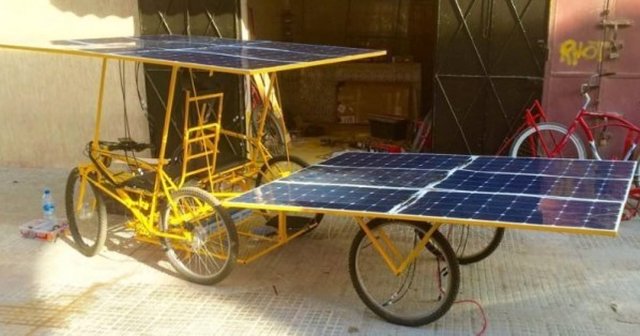
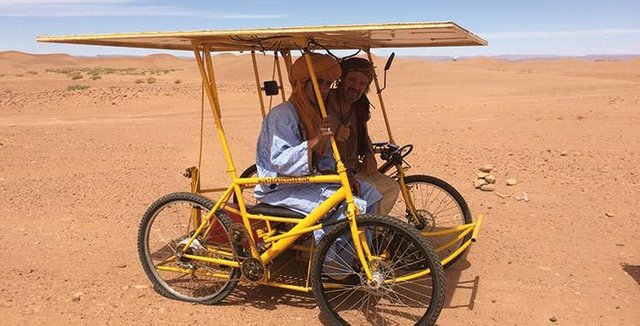
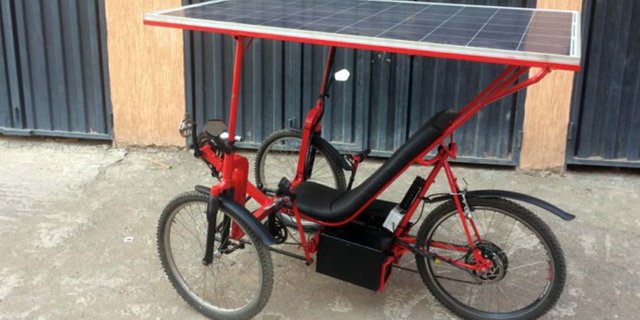
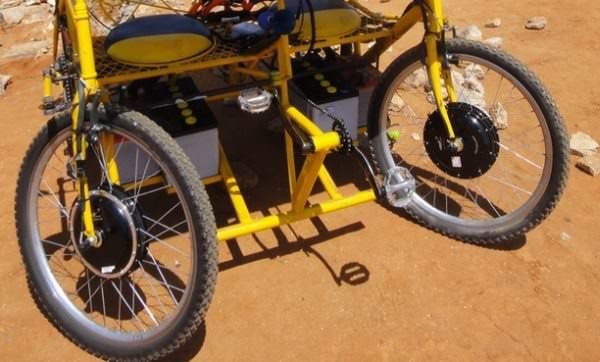
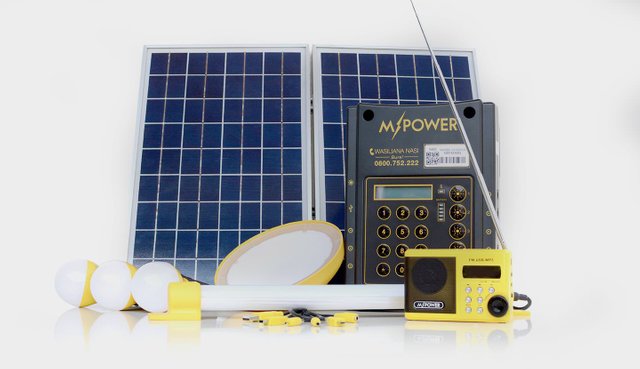
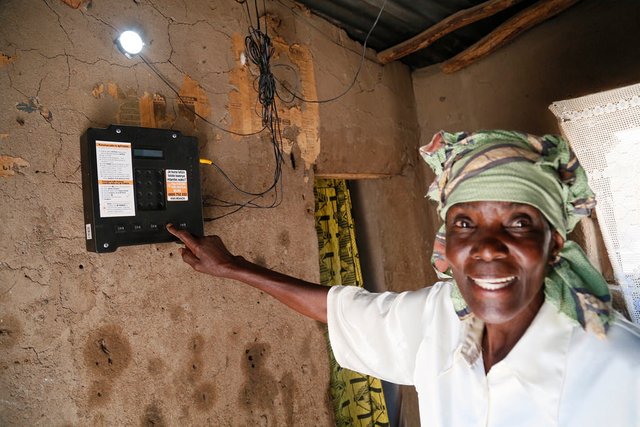
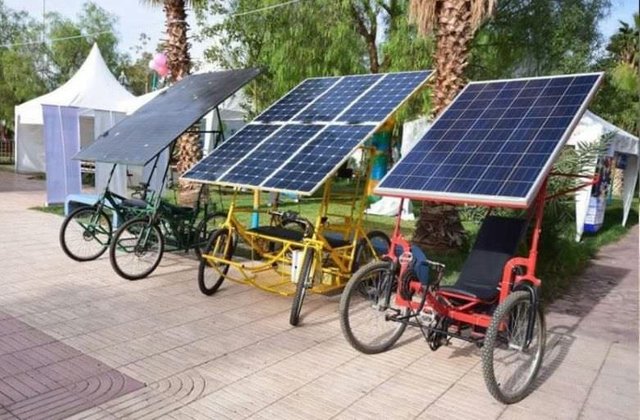
@alexbeyman,
I wish and hope Sri Lankan f#$king government and politicians will look and learn from them! We got 365/7 Solar, but do you believe these politicians are hate to introduce eco friendly concepts?
They introduced 300% tax on fully eco friendly vehicles and hybrid vehicles! That's how they are doing!
Due to their BS, I already missed a chance to buy a Toyota Hybrid in cheaper price!
Cheers~
Steemit is the perfect place for microloans to buy solar torch. Payment back can be made by publishing articles. I am working on such a contract with @thegreens
It is an innovation that could revolutionize mobility in rural areas of Africa, while providing electricity to homes not connected to the grid and limiting greenhouse gas emissions.
The use of solar cells for energy sources already needs our attention. As the picture above I see the people of Africa have been able to use this technology. This is important to reduce the use of fossil materials such as petroleum.
This technology is a bit expensive at the beginning but will be cheap when it's in use. The tropics,, Australia and Africa are areas suitable for the development of this technology.As an enggineer I really support your idea. We understand government regulation in this case is still less then business as you do is extraordinary thing.
Congrats bro @alexbeyman Good luck. Thanks for the smart idea
Brother. I have one question in this case. When with excessive use of solar cells will not have an impact on construction and the environment? Or what about the batteries that will become waste in the future. This can also be our concern.
Most types of batteries include toxic heavy metals which must be smelted, a very emissions heavy process. Lithium is unique in that it can be made into mostly non-toxic batteries, and because lithium is a fairly soft metal it can be hydraulically extruded into the shapes needed for batteries instead of smelting. It is by far the cleanest type of battery.
Solar panels do include some toxic metals, but you have to weigh that cost against how much emissions they prevent from going into the atmosphere if fossil fuels were used instead.
a very good explanation, because the negative side must also be seen as part of a process. I hope this can be realized.
Ca I know your email?
No, sorry.
Bro @ alex. Actually the biggest obstacle in the application of solar cells in Indonesia is the availability of batteries. It's expensive. So the investment for this is a constraint. Both people's understanding of this also becomes very important. In the area I live there are street lamps from solar cells. But much is broken and there is no maintenance. I am sad to see something like this. Because today bro @ alex took pains to support this effort. But on the other hand this is not considered.
I understand if you do not provide email in public spaces. I apologize. Tp please email me here. [email protected]. Because I need this related information. Original drawings as our college referrals to students. That's my intentions bro @ alex. Thank you for sharing today's info. I hope you can share with me. Stay cozy
Nice catch with those lead batteries!
You are indeed true, we can't have anything using lead batteries anymore. How about deep cycle batteries that are used to power up the off the grid houses. Those are also lead I think.
Thats quite some innovation, the type that solves problems.
But on the flipside and perhaps unrelated to your post, i have noticed through my interaction with people from other parts of the world that many are really ignorant about Africa, courtesy of all the stuff the Western Media has to say about Africa (surely no good thing, just war, hunger, disease, smh). Well, its not their fault either, imagine someone asking if we had TVs in Africa, like wtf??? Africa aint half as bad as most people think it is. Well story for another day.
Well, great innovation like i said, but the exclusive mention of Africa brought up that thought.
Yes, you are right @alexbeyman. The project will be more perfect if using lithium. Sufficient poverty to be their suffering. Do not we add more to their suffering with lead battery waste.
I am totally into solar technology, but I share you skepticism on this one for sure!
Hopefully your suggestion quickly responded by the company @alexbeyman. However, lithium batteries are better than lead batteries. And hopefully this great step is right on target for developing countries in Africa.
This will be a sure way to ease transportation to save energy without polluting the environment. Is high time they move to lithium battery. I am currently searching for a battery that will last 24 hours without charge and power some major electric appliances